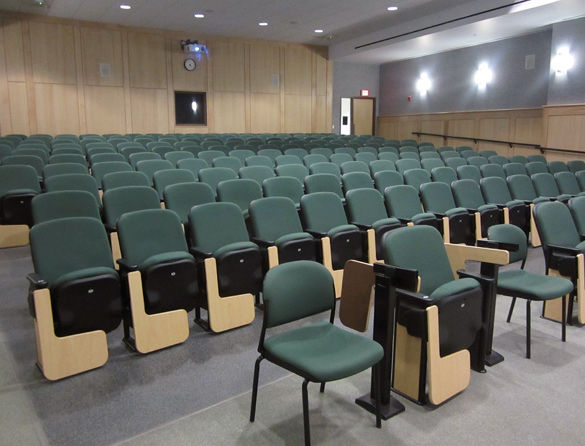USG, GPSC leaders urge students to get involved after low turnout at meeting

March 30, 2016
After less than five students showed up to a Undergraduate Student Government and Graduate and Professional Student Council town hall meeting this week, students’ leaders are looking for support.
Brandon Woudenberg, GPSC’s president, said the purpose of Tuesday’s meeting at Morris Library’s Guyon Auditorium was “to provide a forum for all students to have a comfortable place to come talk to us about the issues that they are concerned about.”
He said they excluded administrators and faculty from the meeting so students would feel at ease.
Advertisement
Kevin Gettis, president of USG, said they promoted the meeting through social media and paper flyers.
Gettis, a senior from Belleville studying history, said students should participate more because these two units represent the student body in front of administrators.
“Maybe we can do more work ourselves to blast it out even more, or get out on campus and do more face-to-face promoting,” he said. “I’m kind of disappointed because these are hot topics and you would think that students would be excited to speak with their leadership to get the points they want across to us.”
Woudenberg said the lack of student interest is especially disheartening because of the little time left in the school year, and the fact that these issues aren’t going anywhere.
The third-year law student from Carbondale said their goal is to start holding town hall meetings regularly, and their next one is scheduled at 6 p.m. April 27 in Guyon Auditorium.
Gettis said students are also welcome to voice their concerns at their general meetings held every other Tuesday in the Student Health Center auditorium.
“We should be a little bit more accountable of creating a culture where people feel comfortable, where a USG or GPSC meeting is an event that students look forward to,” Gettis said.
Advertisement*
As for future meetings, Woudenberg said students must take an interest.
“Even if the faculty or administration has the intention of doing what’s right for the student, they don’t really know because they can’t empathize,” Woudenberg said. “Most of them are 20, 30 years removed from being in school.”
Woudenberg shared a success story where the two organizations found out about a student issue early enough to solve it. The entities’ Health Center Advisory committee got SIU to provide students with upgraded health insurance last year.
“Up until this year, students who were on the student health insurance were paying a fee for really crappy health insurance, because it really didn’t get you anything,” Woudenberg said. “It provided so little coverage, no prescription benefits.”
However, the groups weren’t able to help students with the bursar cap decrease this year because they found out about it too late.
He said they didn’t find out about students opposing the change until about two weeks after the rule went into effect and three to four months after the meeting where the decision was made.
Gettis said there are many ways to get involved with USG besides being president or joining the senate, which has 18 of 55 seats open. He said students can also join committees, which are different groups that have the power to affect change in specific areas.
Woudenberg said the two organizations have trouble maintaining a large amount of students is not new, but it is now more crucial.
“We’re facing situations never seen before in the history of the state of Illinois especially as it relates to higher learning,” Woudenberg said. “Now more than ever we need students to step up and fight for themselves.”
Tierra Carpenter can be reached at tcarpenter@dailyegyptian.com or 618-536-3325.
Advertisement








